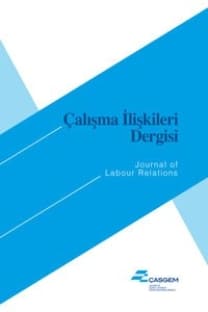ÖĞRENİLMİŞ GÜÇLÜLÜK: ÖĞRETMENLER ÜZERİNDE BİR UYGULAMA
Bu çalışmada, öğretmenlik mesleğini yerine getirmekte olan çalışanların öğrenilmiş güçlülük düzeylerinin cinsiyet, yaş, eğitim düzeyi, medeni durum, kıdem, pozisyon gibi değişkenlere bağlı olarak saptanması amaçlanmıştır. Araştırma, Yalova iline bağlı ilköğretim okulu ve liselerde görev yapan toplam 1190 öğretmen arasından kolayda örnekleme yöntemine göre seçilmiş okullarda çalışan 350 öğretmen ve okul yöneticisi üzerinde yürütülmüştür. Araştırmada “Öğrenilmiş Güçlülük” bağımlı değişkeni, Rosenbaum’un geliştirmiş olduğu “Öğrenilmiş Güçlülük Ölçeği” kullanılarak ölçülmüştür. Araştırma için oluşturulan anket formundan elde edilen veriler SPSS programı aracılığıyla değerlendirmeye alınmış ve araştırmanın sorunsalına cevap bulmak için çeşitli istatistiksel yöntemlere başvurulmuştur. Ölçeğin tamamına ilişkin elde edilen değerlendirme sonucu öğrenilmiş güçlülük ortalamasının 127,41 olduğunu göstermektedir. Araştırma kapsamındaki okul yöneticisi ve öğretmenlerin öğrenilmiş güçlülük düzeylerinde istatistiksel açıdan anlamlı bir farklılık olmadığı görülmüştür. Öğretmenlerin medeni durumlarının evli ya da bekâr olmalarının öğrenilmiş güçlülük düzeylerinde farklılık yaratmadığı tespit edilmiştir. Araştırmada öğretmenlerin cinsiyetleri açısından öğrenilmiş güçlülük düzeylerinin farklılaşmadığı tespit edilmiştir. Öğretmenlerin yaş gruplarına göre de öğrenilmiş güçlülük düzeyleri arasında anlamlı farklılık bulunmamıştır. Ancak öğretmenlerin mesleki kıdemlerine göre ve öğrenilmiş güçlülük düzeyleri arasında anlamlı fark olduğu görülmüştür. Ayrıca araştırmada öğretmenlerin eğitim düzeylerine göre de öğrenilmiş güçlülük düzeylerinin farklılaştığı tespit edilmiştir. Buna göre lisansüstü eğitim derecesine sahip olan öğretmenlerin, olmayanlara göre öğrenilmiş güçlülük düzeylerinin daha yüksek olduğu görülmüştür.
LEARNED RESOURCEFULNESS: AN APPLICATION AMONG TEACHERS
In this study, it is aimed to determine the level of learned resourcefulness of the employees, who are pursuing the teaching profession, in terms of gender, age, education level, marital status, seniority, position at work. This research was executed on 350 teachers and school administrators chosen through convenience sampling method among 1190 teachers working at Primary and Secondary schools in Yalova. The dependent variable “Learned Resourcefulness” was measured by using the “Learned Resourcefulness Scale” developed by Rosenbaum. The data gathered through the survey designed for the research, were evaluated by using SPSS and various statistical methods were applied to seek the explanations for the problematic of the research. First analyse is showed that the average of the Learned Resourcefulness is 127,41. It was also seen that there is no significant difference between the levels of Learned Resourcefulness of the administrators and teachers. It was determined that marital status does not create any difference on the levels of Learned Resourcefulness. It was also found that the level of Learned Resourcefulness does not differentiate by gender. Moreover, there is no significant difference between the age groups and the level of Learned Resourcefulness of teachers. However a significant difference between the seniority and the level of Learned Resourcefulness was observed. Last of all, it was found out that, the level of Learned Resourcefulness of teachers differs according to their education level, which can be further explained that the level of Learned Resourcefulness of the teachers who have master degrees is higher than the teachers who do not have master degrees.
